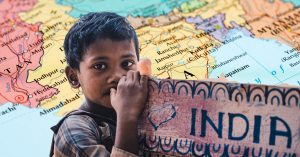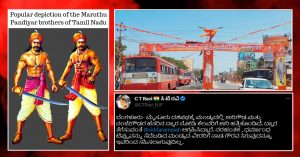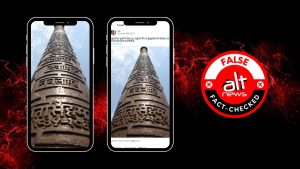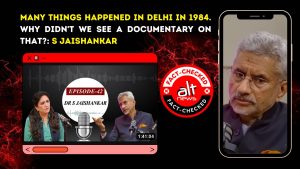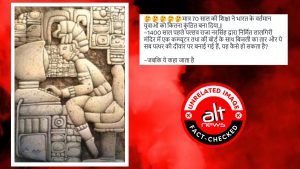The image of a letter from a book has been widely circulating on social media and on Whatsapp with the claim that it is the copy of the memorandum through which the British Raj officially recognized the title of ‘Mahatma’ assigned to Mohandas Karamchand Gandhi.
The letter dated September 2, 1938, is addressed to various departments of the province and says, “In future, Mr. Gandhi should be referred to in all correspondence as ‘Mahatma Gandhi’.”
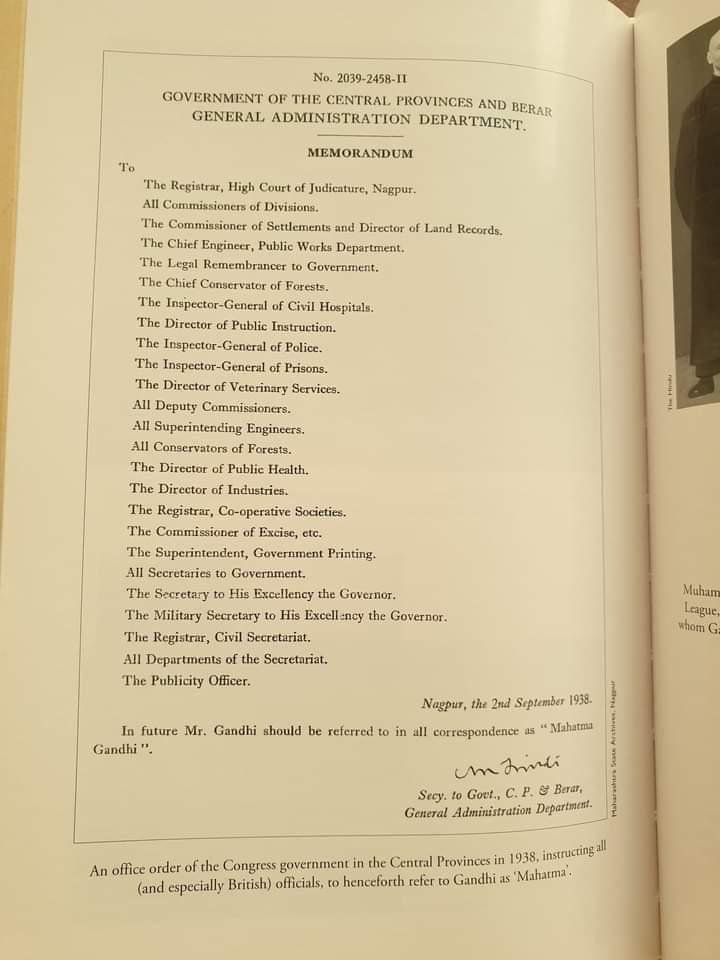
A request was forwarded to the Alt News helpline (+91 7600011160) with an accompanying caption that read, “Gandhi was made Mahatma by Britishers n not by PPL of India. Do u need any other proof?” Alt News has also received a request on its official app to verify the authenticity of this claim.
Prominent Twitter users like Rishi Bagree who has a history of sharing factually inaccurate information, have also shared the text on the platform. Bagree’s tweet read, “It is interesting to see the memorandum of the British government through which Mr. Gandhi became Mahatma Gandhi officially.”
It is interesting to see the memorandum of the British government through which Mr. Gandhi became Mahatma Gandhi officially pic.twitter.com/lilUngcBSI
— Rishi Bagree (@rishibagree) January 3, 2023
The claim is circulating widely on Facebook. Below we have added a screen recording to show the virality of the post
Fact Check
We first noticed that the viral memorandum was issued by the Government of the Central Provinces and Berar in the year 1938. The letter appears to be part of some historical text and it also has a description at the end that says, “An office order of the Congress government in the Central Provinces in 1938, instructing all (and especially British) officials to henceforth refer to Gandhi as ‘Mahatma’.

In the book ‘History of the Central Provinces and Berar‘, published in 1917, it is mentioned that the formation of the Province happened in 1861 as Nagpur, Saugor and Nerbudda territories were too remote from the headquarters of any local government to be efficiently administered (p.156). Berar became a part of the province after an agreement had been entered into with the Nizam of Hyderabad. It came into effect in October 1903, when Berar was transferred to the administration of the chief commissioner of the Central Provinces (p.166).
In 1935, the Government of India Act was passed by the British Parliament (read PDF) which paved the way for elections with certain regulations. The provincial elections were first held in 1937 and the Indian National Congress secured a sweeping victory in five provinces namely Madras Presidency, United Provinces of Agra and Oudh, Central Provinces and Berar, Bihar and Orissa. The relationship between the Indian National Congress and the Muslim league had also started to sour during this period.
So, the Congress was in power in 1938 when the memorandum was circulated, this is evident when we take a look at the book ‘The Indian National Congress and the Raj, 1929–1942’ by B R Tomlinson published in 1976. He notes that the elections of 1937 led to ‘a considerable rise in the membership and the power of the Congress in the provinces’.
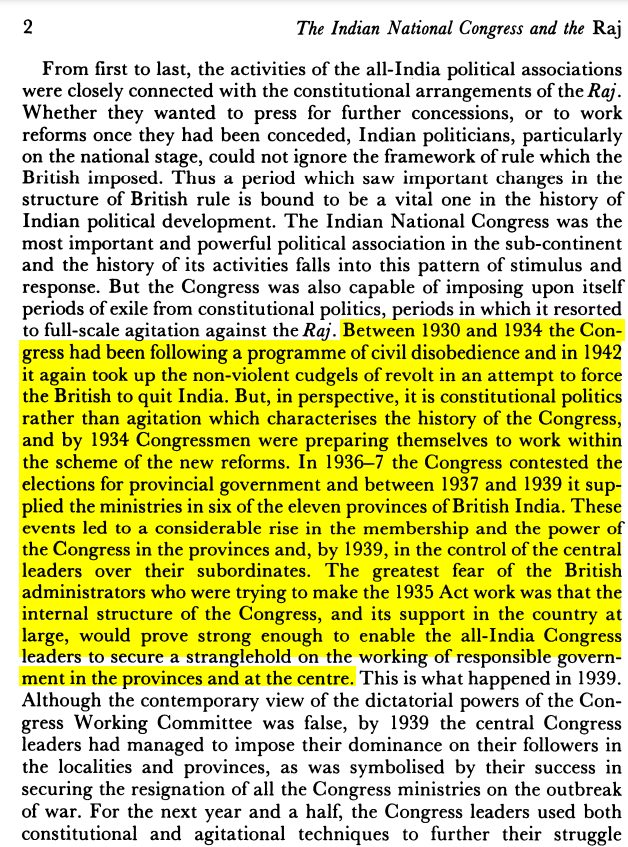
We showed the viral memorandum to a professor of Indian History who spoke to us on the condition of anonymity. “The memorandum is likely genuine, and I even recall seeing evidence that the Muslim League protested the instruction to have Gandhi referred to as Mahatma at the time. It was only natural for a Congress government, newly elected in 1937 under the system of dyarchy, to want its leader referred to in official communication by the title used for him in public life. There is no hint the British connived at this, indeed the opposite, as the memo is in part intended to humiliate British officials by compelling them to respect a man who was only recently being called seditious,” said the professor.
The statement of the professor also matches the description of the memorandum as it was the British officials who were specially instructed to follow the order.
The title of ‘Mahatma’
The source of the title ‘Mahatma’ for Gandhi has been a point of debate for years. It is popularly believed that the title was coined by the Nobel laureate, Rabindranath Tagore. In the book ‘Rabindranath Tagore: an anthology‘, the authors write in the introduction that Tagore was the one who first called Gandhi the Mahatma. However, the excerpt they have cited supporting their claim has Tagore writing that he endorses the title of Mahatma given to Gandhi by the people of India.
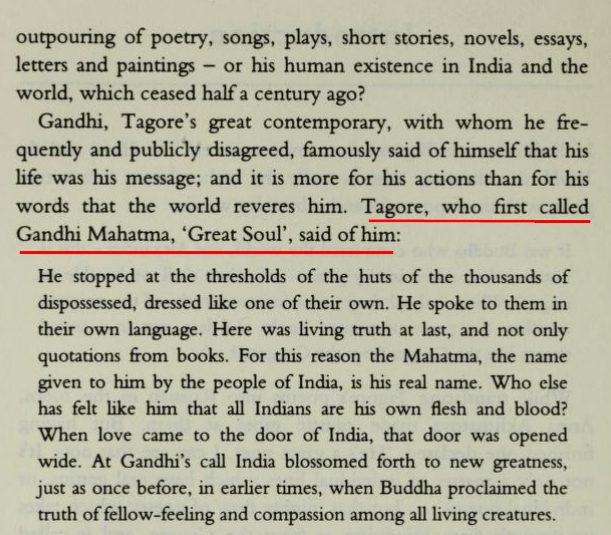
The late Sankha Ghosh, an eminent poet and Tagore scholar, believed it was a wrong perception that Tagore gave the title. In 2016, after a controversy erupted over a claim that a journalist from Gujarat had first used the epithet, Ghosh told The Times of India, “Gandhiji was first addressed as ‘Mahatma’ at a reception at the Durban town hall in South Africa on July 12, 1914. The Indian government has published this fact in a book, ‘Mahatma Gandhi A Chronology’.” Ghosh, however, mentioned that Tagore had popularized the title, the report adds.
Alt News also showed this to the Professor of Indian History who told us “I’m not sure who first coined the honorific Mahatma for Gandhi, but it is believed by a section of historians that the first person to do so was his friend, Dr Pranjivan Mehta, who wrote to Gopalkrishan Gokhale in 1909 referring to Gandhi by that title. Tagore then popularized it. It is possible that there was no single origin to the title as used for Gandhi, and that a number of people started referring to him in this manner sporadically until the practice caught on.”
2016 Gujarat High Court order
In 2016, the Rajkot Zilla Panchayat Shikshan Samiti, an agency responsible for hiring Talati positions in the revenue department for Rajkot and several other districts, cited the work of Gandhian scholar Narayan Desai to assert that Gandhi was first called ‘Mahatma’ in an anonymous letter sent from Jetpur while he was still in South Africa.
Sandhya Maru, a candidate appearing for the exam, filed a petition in the Gujarat High Court regarding answers to three questions, including a question about who first referred to Gandhi as ‘Mahatma’. It was argued that the provisional answer key had the correct answers, but the final key altered them to incorrect answers. The provisional key stated that ‘Tagore’ was the correct answer, but in the final key, it was changed to ‘unknown journalist’.
While disposing of the petition, Justice JB Pardiwala observed that all school textbooks cited Tagore as the source of the title. The order notes, “Coming to the second question about who bestowed the title ‘Mahatma’ on Gandhiji is concerned, I may take note of the fact that in the textbooks published by the Gujarat Secondary Education Board, more particularly, Standard 9, it has been stated therein that it was ‘Ravindranath Tagore’, who bestowed the same.”
It further adds, “If the students of the State are being taught accordingly, then I fail to understand on what basis the respondents have come to the conclusion that some unknown journalist in South Africa for the first time bestowed the title ‘Mahatma’. What I am trying to drive at is that before framing any question, the authorities concerned should be 100% sure of the answer. The candidate, who is appearing in a competitive examination, would definitely go by the textbooks published by the Gujarat Secondary and Higher Secondary Board. Let me assume for the moment that the answer is debatable, but once as a part of the education curriculum, it is made clear that it was “Rabindranath Tagore”, then, there need not be any further debate on the issue. Therefore, the correct answer should be the Nobel laureate Rabindranath Tagore.”
The court ordered the local body to amend the petitioner’s result by awarding the appropriate marks. The full judgement can be read here.
To sum up, while it is uncertain who first used the title ‘Mahatma’ for Gandhi, there is clearly no evidence to suggest that it was the British Raj. The viral memorandum circulating on social media is a notice issued in 1938 when the Indian National Congress was leading the provincial government of the Central Provinces and Berar.
On the other hand, the British Raj had indeed given a title to MK Gandhi, but that was Kaiser-i-Hind. The University of Edinburgh archives note, “The Kaisar-i-Hind Medal for Public Service in India was a medal awarded by the British monarch between 1900 and 1947… to civilians… who rendered distinguished service in the advancement of the interests of British India… The most famous recipient of the Kaisar-i-Hind Medal is Mohandas Gandhi, who was awarded it in 1915.”
Gandhi gave up the title after the Jalliwanwala Bagh massacre.
Independent journalism that speaks truth to power and is free of corporate and political control is possible only when people start contributing towards the same. Please consider donating towards this endeavour to fight fake news and misinformation.
